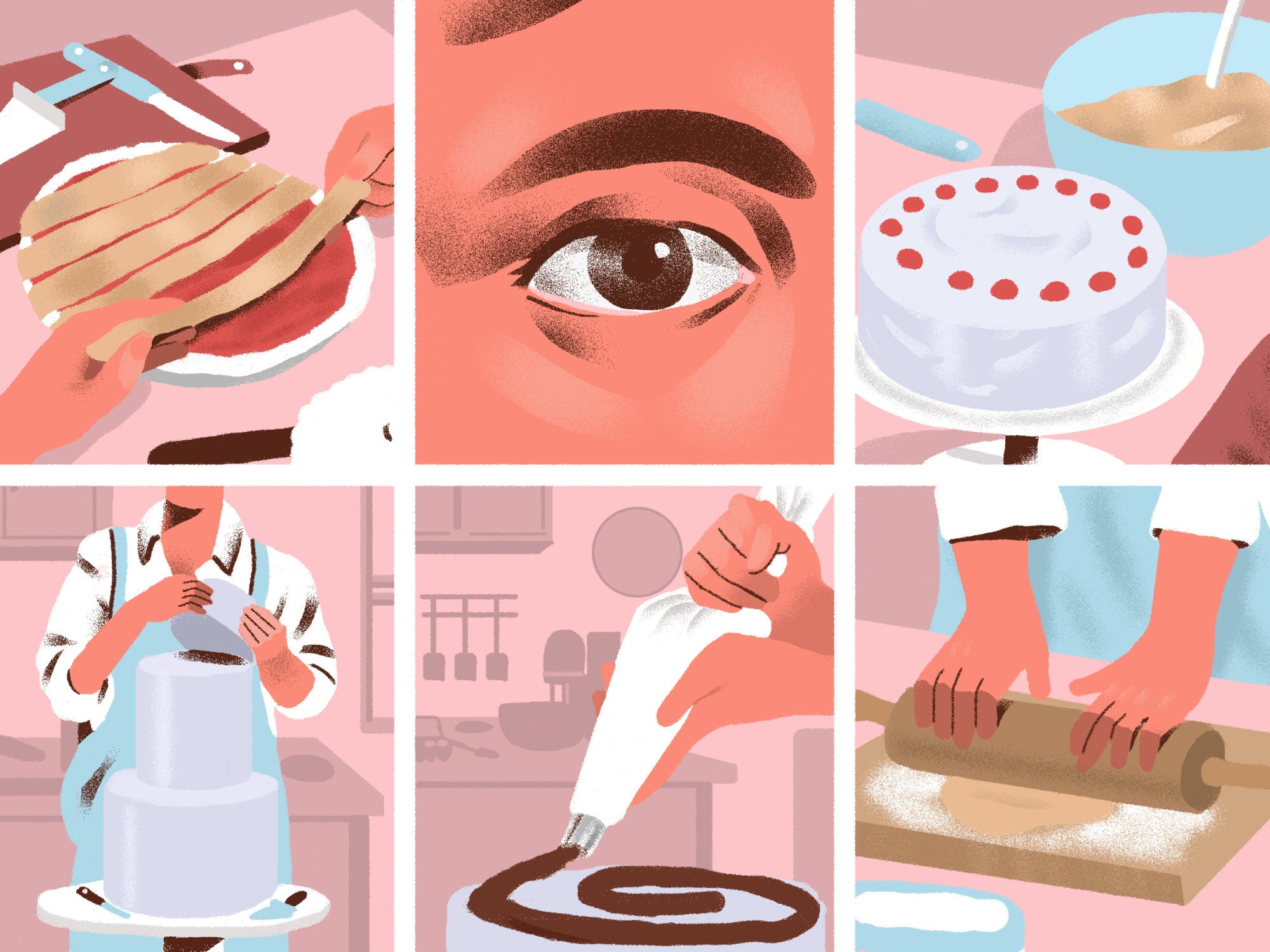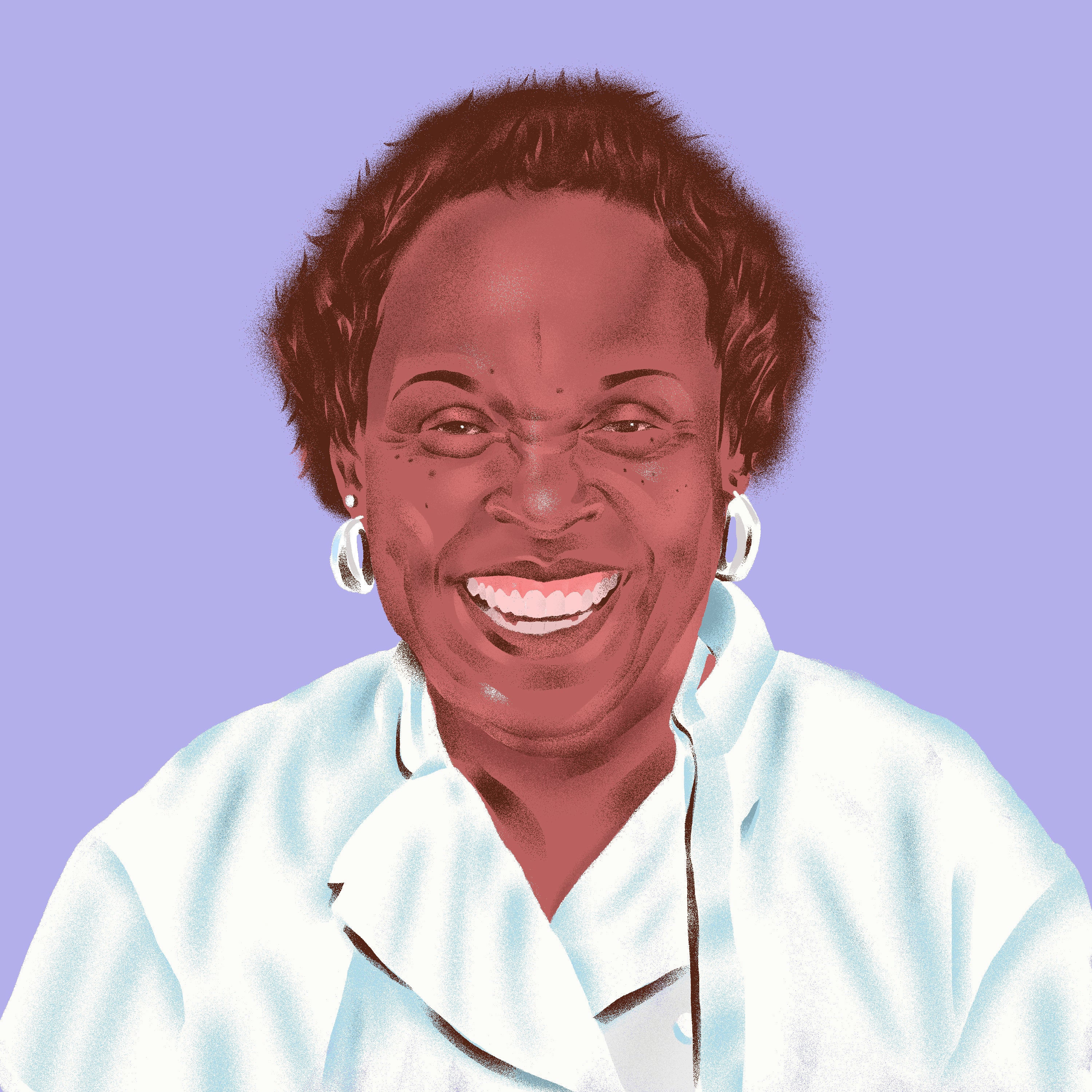
Dolester Miles winning the James Beard Award for Outstanding Pastry Chef is the culmination of a long road traveled for African-American pastry chefs.
I watched with the world via a choppy Twitter live stream as the James Beard Foundation decorated a record number of black chefs from all corners of the culinary landscape. The overarching theme of the night’s awards, presented in Chicago on May 7, seemed to be that these chefs in contention for the highest awards in American gastronomy were being recognized for their authenticity and clarity of voice. The wins were a celebration of these chefs luxuriating in the fullness of their blackness in a way that demanded respect, but they also signaled for me the potential for a critical paradigm shift in the conscience of American dining, a recalibration of culture meeting history.
Perhaps the most stunning of these awards came in the form of powerhouse chef Dolester Miles and her win for Outstanding Pastry Chef, for her work at the Highlands Bar & Grill in Birmingham, Alabama. Miss Dol took to the stage with a little shock and a beautifully simple speech that spoke to the humility with which she accepted the award. Later Kim Severson, writing for The New York Times, penned a gorgeous profile documenting the sort of guileless Southern baking that won Miles this highest honor. Miss Dol, 61, talks about work ethic, tradition, and respect for craft as the hallmarks of her 35-year career, and with all the fanfare and think pieces on increasing diversity in the food world swirling through the ether, it got me thinking about what a closer look at this win, through the lens of Southern baking as a whole, may tell us about how to qualify black identity in this work.
In the ways that count most, I’m essentially a Northern chef two generations removed from the South. My grandparents were transplants to the North—moving from Latta, South Carolina, to Newark, New Jersey, in the late ’50s—so my food roots are very much a Southern story by proxy. This is important because we know that Southern cooking is the only fully formed culinary tradition for which we have a complete lexicon to work from, and that black lives played a critical role in the development of that vocabulary.
As I navigate my life as a chef, I’m confronted with the task of trying to find evidence through history for how black chefs have gifted this country with the recipes and techniques that make up the canon of American cookery, and in this search I find that it’s the baking that gives us the clearest proof. But if I were to understand the personal narrative of Southern baking, I needed to hear from marrow-deep Southern chefs to find out if my suspicions about the essential nature of these traditions held true. I wanted to know if the lessons of hundreds of years of generational recipes could tell me something important about the legacy I know intuitively to be true.
It’s a Thursday afternoon a little over a week after the Beard Awards, and I’m on a Facebook video chat with two of the most wonderful chefs I know. Adrian Lipscombe, a native of Austin and the chef-owner of the Uptowne Cafe in LaCrosse, Wisconsin, makes some of the most beautiful pastries and candies I’ve ever eaten and is also a kick-ass savory chef. She’s talking about how she’s just purchased her fifth hog to test recipes and workshop her butchery and charcuterie techniques.
Enrika Williams, who is a gloriously Afro’d and infectiously effervescent chef from Jackson, Mississippi, has used her career to indulge a kind of food-driven wanderlust, traveling the country and working with chefs such as Richard Blais, Carla Hall, Sean Brock, and Emeril Lagasse. Enrika is telling us about her wildly successful dinner series that recently wrapped up and an upcoming move to New Orleans. We’re discussing food, politics, and career, and I bring the conversation around to chef Miles. I wondered what her win said to them about the power of tradition in this complex world of defining black foodways, and more broadly American cooking, and my friends had no trouble giving me context.
Adrian reminded me of the church tradition of baking cookbooks filled with heirloom recipes that the women of nearly every Baptist church would circulate. These books were sold as part of fund-raising efforts for the churches, but they also became this wonderful independent publishing network that passed down hundreds of years of pastry traditions. Enrika talks about the pride you would be honored with if an auntie or, more reverently, your grandmother, requested you bake a cobbler or pound cake. Their passionate stories and hilarious remembrances got me thinking about the power of Southern baking not just as heirloom, but as evidence that recognizes the contributions of the thousands of unsung chefs history has gifted us with.
My friends gave me personal narrative, and then I looked to history. Consider James Hemings at the birth of the nation. Our first classically trained gourmand, Hemings was taken to France by Thomas Jefferson and considered free the moment his feet touched the country. Cooking instantly elevated his station. In France, Hemings was trained in the kitchens of Versailles and all the most chic and relevant kitchens in Europe. He then came back to the United States and started what was essentially the first cooking school at Monticello—an institution that aims to upgrade the gastronomic reach of America by infusing technique into what up to that point had been simple colonial cooking. Hemings brought back to Virginia a sophistication with a wide repertoire of dishes, including everything from macaroni and cheese to French fries. But it’s Hemings’s baking that turned out to be superlative. He gave us ice cream and custards and the earliest cakes. His innovation and improvisational swagger brought authority to all the baking that now spreads throughout the country.
Hemings and his technique-driven cooking lead us to the possibility of someone like Anne Northup a generation and a half later. Chef Northup was notably the wife of Solomon Northup, a captured free man and the author of the best-selling work 12 Years a Slave, which chronicled his experiences as a slave. But she was more notable in her own right as an acclaimed pastry chef in the mid-19th century. Historian and colonial cookery expert Tonya Hopkins is maybe our greatest living expert on the life of Anne Northup. Hopkins, a culinary-history commentator and frequent lecturer, was commissioned by the Underground Railroad Historic Association back in 2014 to present a dinner centered around Northup’s legacy.
In her presentation, Hopkins pointed out that Northup was so sought after as a confectioner that she would travel the country and work as a chef in residence for wealthy families and hotels all over the country. Based in Saratoga, New York, the Northup family lived well among a small settlement of freed black people, and it was Anne’s culinary abilities that afforded her an elevated social status and her family a degree of comfort and resources. This idea is profound because most of the papers and records of Northup that Hopkins could find centered around her pastry work.
Northup was certainly an outlier in some ways, given her husband’s extraordinary circumstance and because of her culinary excellence and freed status, but the trend in the mid-19th and early 20th centuries was to rely on the expertise of the chefs and cooks of the moment to bring style and sophistication to this newly formed nation. America was a republic in flux with new wealth and opportunity, and the burgeoning culinary attitudes of the day correlated with all the new ways people had to show off social status.
Restaurant culture is a relatively modern affectation, so it was the hotel or the private home where gastronomy was being created, and your status and wealth was contingent on how well you dined and entertained. The chef becomes critical to this narrative, and it’s largely the enslaved, then the freed, black chef that dominated these service jobs well into the mid 1950s, which provides us another puzzle piece that evidences our critical role in the construction of American gastronomy. As double James Beard Award–winning writer and historian Michael Twitty says in his gorgeous opus The Cooking Gene, “Black folks are the only enslaved people who managed to enslave the palates of our enslaver.”
Credit and accuracy are important to me because I think that a short memory steals from us the gift of hard-fought lessons. This got me thinking about how we contextualize the soul food narrative as the totality of the black culinary legacy of this country and misunderstand that these threadbare gems are actually a snapshot of a wildly transformational era in American foodways. Soul food is the immigrant cuisine of the American South. As black people fled the region to find safety and freedom, they took with them the recipes and culinary tradition they had been building all along.
As American restaurant culture was being birthed, black people were largely segregated or excluded, so the soul food restaurant became our culinary home, and again baking is where we see the strongest and most potent stories. Southern baking is one of the great saviors of the civil rights era. From back-door restaurants like Mrs. Georgia Gilmore’s Club From Nowhere to the late iconic matriarch of Mama Dip’s restaurant, the late Mrs. Mildred “Mama Dip” Cotton Council, our baking traditions gave us celebration and connectivity. These cakes and pies were more than sweets; they were nostalgia and comfort and respite from the realities of the day. The fact that you could bake dozens of pies or pound cakes for very little money and earn a living, fund a resistance movement, was a wonderful byproduct. For me the hundreds of soul food spots around the country that are standing their ground by remaining open in the face of a changing culinary landscape, baking the same cobblers, pies, and cakes may very well be the last line of defense we have for keeping these traditions alive.
If I were to understand the personal narrative of Southern baking, I needed to hear from marrow-deep Southern chefs to find out.
One of my favorite books on Southern baking is Southern Pies: A Gracious Plenty of Pie Recipes, From Lemon Chess to Chocolate Pecan, by a fascinating cookbook author as well as maybe the nicest person on earth, Nancie McDermott. Taking a break from the canon of Thai cooking that had been the hallmark of her extraordinary writing, McDermott decided to use the lens of Southern pies to write this beautiful love letter to Southern baking. She’d lived all over the world and explored all manner of cultures in her work, but like most great artists do, she went back to her roots, in Piedmont, North Carolina, and formulated this simple, though technically beautiful, study in what makes a perfectly crafted pie so powerful. She followed up her Southern-pies book with Southern Cakes: Sweet and Irresistible Recipes for Everyday Celebrations, and what I took away from her stories and recipes was the power of remembrance and the technical authority that pastry work seems to have. Nancie’s wonderful books give us evidence of how these recipes are critical to understanding the historical reach of Southern cooking and give us the foundation we need to think more broadly about what American cooking really is.
I think I may have learned the most valuable lessons of my culinary life trying to channel the mystical power of a poured caramel cake icing—more than in the combined efforts of my very expensive four years of culinary school—and I wonder if I should be outraged or humbled. Perfect Southern caramel cake is quite exquisite, yet deceptively simple. The care that must be paid in order to bake a perfect cake that is structurally sound enough to stand up to the hot icing yet tender enough to melt on the tongue with the same finesse as the icing is a revelation when it’s achieved. The icing, a beautiful and rich brown sugar fudge, takes patience, science, attention, and timing; it must be poured onto the perfectly cooled cake layers so that the glorious multiple layers are staked and set without marring the immaculately smooth finished texture. This cake has been baked for almost 100 years, and the process has been essentially the same the whole time. There is power in that.
There is something wonderful about simple ingredients that turn into something special with a little care and a few notes from the ancestors. I can become Anne Northup and Georgia Gilmore and Edna Lewis with a few hours’ work and a little reverence. I think it would be easy to misunderstand the magical sleight of hand Miss Dol pulls off at Highlands Bar and Grill as simple intuition and muscle memory. It would also be a misreading of history because it would discount the lives lost and the dignity found in the sifted flour and soft butter that has sustained life and a miraculous culinary legacy for hundreds of years. Miss Dol and all the other black chefs awarded this year for unqualified excellence was a Wakanda-style wink and nod to other black chefs. It said that enrobing your work with the gift of tradition is a valuable tool to cultivate, and for me no one personified this lesson more than chef Dolester Miles standing in front of those folks teary-eyed and glorious, having just trounced the competition with lemon tarts and pecan cakes.


